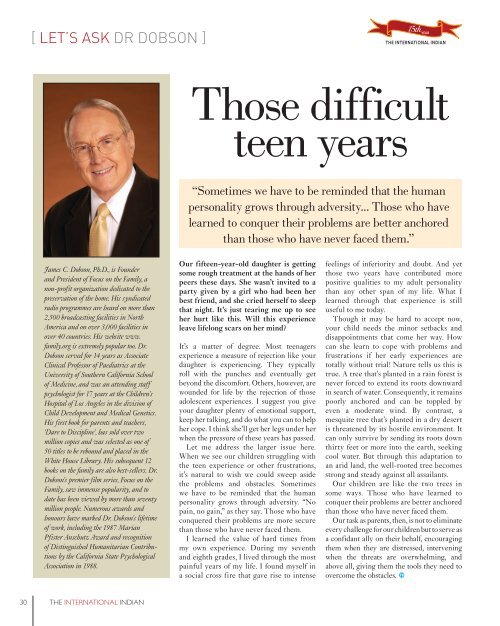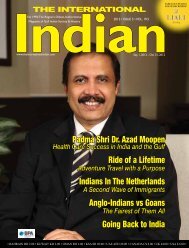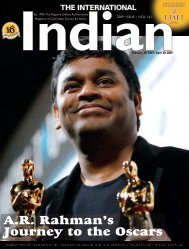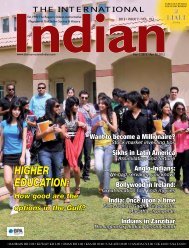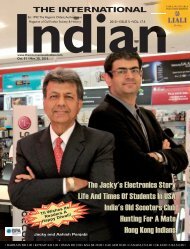THE INTERNATIONAL - International Indian
THE INTERNATIONAL - International Indian
THE INTERNATIONAL - International Indian
You also want an ePaper? Increase the reach of your titles
YUMPU automatically turns print PDFs into web optimized ePapers that Google loves.
[ LET’S ASK DR DOBSON ]<br />
Those difficult<br />
teen years<br />
“Sometimes we have to be reminded that the human<br />
personality grows through adversity... Those who have<br />
learned to conquer their problems are better anchored<br />
than those who have never faced them.”<br />
James C. Dobson, Ph.D., is Founder<br />
and President of Focus on the Family, a<br />
non-profit organization dedicated to the<br />
preservation of the home. His syndicated<br />
radio programmes are heard on more than<br />
2,500 broadcasting facilities in North<br />
America and on over 3,000 facilities in<br />
over 40 countries. His website www.<br />
family.org is extremely popular too. Dr.<br />
Dobson served for 14 years as Associate<br />
Clinical Professor of Paediatrics at the<br />
University of Southern California School<br />
of Medicine, and was an attending staff<br />
psychologist for 17 years at the Children’s<br />
Hospital of Los Angeles in the division of<br />
Child Development and Medical Genetics.<br />
His first book for parents and teachers,<br />
‘Dare to Discipline’, has sold over two<br />
million copies and was selected as one of<br />
50 titles to be rebound and placed in the<br />
White House Library. His subsequent 12<br />
books on the family are also best-sellers. Dr.<br />
Dobson’s premier film series, Focus on the<br />
Family, saw immense popularity, and to<br />
date has been viewed by more than seventy<br />
million people. Numerous awards and<br />
honours have marked Dr. Dobson’s lifetime<br />
of work, including the 1987 Marian<br />
Pfister Anschutz Award and recognition<br />
of Distinguished Humanitarian Contributions<br />
by the California State Psychological<br />
Association in 1988.<br />
Our fifteen-year-old daughter is getting<br />
some rough treatment at the hands of her<br />
peers these days. She wasn’t invited to a<br />
party given by a girl who had been her<br />
best friend, and she cried herself to sleep<br />
that night. It’s just tearing me up to see<br />
her hurt like this. Will this experience<br />
leave lifelong scars on her mind?<br />
It’s a matter of degree. Most teenagers<br />
experience a measure of rejection like your<br />
daughter is experiencing. They typically<br />
roll with the punches and eventually get<br />
beyond the discomfort. Others, however, are<br />
wounded for life by the rejection of those<br />
adolescent experiences. I suggest you give<br />
your daughter plenty of emotional support,<br />
keep her talking, and do what you can to help<br />
her cope. I think she’ll get her legs under her<br />
when the pressure of these years has passed.<br />
Let me address the larger issue here.<br />
When we see our children struggling with<br />
the teen experience or other frustrations,<br />
it’s natural to wish we could sweep aside<br />
the problems and obstacles. Sometimes<br />
we have to be reminded that the human<br />
personality grows through adversity. “No<br />
pain, no gain,” as they say. Those who have<br />
conquered their problems are more secure<br />
than those who have never faced them.<br />
I learned the value of hard times from<br />
my own experience. During my seventh<br />
and eighth grades, I lived through the most<br />
painful years of my life. I found myself in<br />
a social cross fire that gave rise to intense<br />
feelings of inferiority and doubt. And yet<br />
those two years have contributed more<br />
positive qualities to my adult personality<br />
than any other span of my life. What I<br />
learned through that experience is still<br />
useful to me today.<br />
Though it may be hard to accept now,<br />
your child needs the minor setbacks and<br />
disappointments that come her way. How<br />
can she learn to cope with problems and<br />
frustrations if her early experiences are<br />
totally without trial! Nature tells us this is<br />
true. A tree that’s planted in a rain forest is<br />
never forced to extend its roots downward<br />
in search of water. Consequently, it remains<br />
poorly anchored and can be toppled by<br />
even a moderate wind. By contrast, a<br />
mesquite tree that’s planted in a dry desert<br />
is threatened by its hostile environment. It<br />
can only survive by sending its roots down<br />
thirty feet or more into the earth, seeking<br />
cool water. But through this adaptation to<br />
an arid land, the well-rooted tree becomes<br />
strong and steady against all assailants.<br />
Our children are like the two trees in<br />
some ways. Those who have learned to<br />
conquer their problems are better anchored<br />
than those who have never faced them.<br />
Our task as parents, then, is not to eliminate<br />
every challenge for our children but to serve as<br />
a confidant ally on their behalf, encouraging<br />
them when they are distressed, intervening<br />
when the threats are overwhelming, and<br />
above all, giving them the tools they need to<br />
overcome the obstacles.<br />
30<br />
<strong>THE</strong> <strong>INTERNATIONAL</strong> INDIAN


